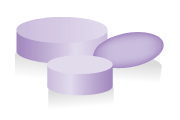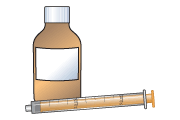Pyrazinamide for the treatment of tuberculosis
This leaflet is for parents and carers about how to use this medicine in children. Our information may differ from that provided by the manufacturers, because their information usually relates to adults. Read this leaflet carefully. Keep it somewhere safe so that you can read it again.
It is essential that your child takes all their medicines daily, as explained by the doctor, and continues until the doctor tells you to stop.
Name of medicine
Pyrazinamide (PIR-a-ZIN-a-myde)
Brand names: Zinamide
Why is it important for my child to take Pyrazinamide?
The bacteria that cause TB are hard to kill. Your child will have to take up to four medicines for at least 3-6 months.
Pyrazinamide is one of these key medicines. It is given for the first 2 months of treatment.
Your child may not necessarily have symptoms from the TB infection. Any symptoms should start to improve soon after starting treatment. You must continue to give the medicines until your doctor tells you to stop. If you stop too soon, or your child does not take the medicines as your doctor has told you to, the bacteria may not be killed and the TB may come back.
It is also possible that the bacteria will become ‘resistant’ to (no longer be killed by) the first drugs, which means that they will no longer work. This may mean that other stronger drugs will have to be used, or the TB will no longer be treatable
What is Pyrazinamide available as?
- Tablets: 500 mg
- Liquid medicine can be ordered specially from your pharmacist
When should I give Pyrazinamide
Pyrazinamide is usually given once each day. This is usually in the morning.
Give the medicine at about the same time(s) each day so that this becomes part of your child’s daily routine, which will help you to remember.
How much should I give?
Your doctor will work out the amount of Pyrazinamide (the dose) that is right for your child. The dose will be shown on the medicine label.
It is important that you follow your doctor’s instructions about how much to give.
How should I give Pyrazinamide?

Tablets
- Tablets should be swallowed with a glass of water, squash or juice. Your child should not chew the tablets.
- You can crush the tablet and mix it with a small amount of soft food such as yogurt, honey, or mashed potato. Make sure your child swallows it straight away, without chewing.

Liquid medicine
- Shake the medicine well.
- Measure out the right amount using an oral syringe or a medicine spoon. You can get these from your pharmacist. Do not use a kitchen teaspoon as it will not give the right amount.
What if my child is sick (vomits)?
- If your child is sick less than 30 minutes after having a dose of Pyrazinamide, give them the same dose again.
- If your child is sick more than 30 minutes after having a dose of Pyrazinamide, do not give them another dose. Wait until the next normal dose.
If your child is sick again, seek advice from your family doctor, nurse, pharmacist, or hospital. They will decide what to do based on your child’s condition and the specific medicine involved.
What if I forget to give it?
If you usually give it once a day in the morning: Give the missed dose when you remember during the day, as long as this is at least 12 hours before the next dose is due.
What if I give too much?
If you think you may have given your child too much Pyrazinamide, contact your doctor or local NHS services (details at end of leaflet). Have the medicine or packaging with you if you telephone for advice.
Are there any possible side effects?
We use medicines to make our children better, but sometimes they have other effects that we don’t want (side effects).
Side effects you must do something about
If your child has swelling of the face, lips or tongue, difficulty breathing or gets a rash or itching or fever, take them to your doctor or hospital straight away, as they may be allergic to Pyrazinamide.
If your child feels sick or is sick (vomits) for more than 24 hours, or their skin or eyes gets a yellow tinge, or their urine (wee) is dark, contact your doctor straight away, as there may be a problem with your child’s liver. Do not give any more Pyrazinamide.
If your child develops pain or swelling in their joints, or they have difficulty or pain during urination (doing a wee), contact your doctor straight away.
If your child seems tired or short of breath or they seem to bruise more easily or bleeding doesn’t stop as quickly as you would expect, contact your doctor straight away, as there may be a problem with your child’s blood.
Other side-effects you need to know about
- Your child may get an upset stomach or cramps when they first start taking pyrazinamide. Giving each dose with some food may help. They may also lose their appetite (feel less hungry). If this is still a problem after a week, contact your doctor
Your child’s skin may become more sensitive to sunlight. Keep them out of strong sun. When outdoors, they should wear a long-sleeved top, trousers and a hat and should use a high-factor sun cream (at least SPF 30).
Your child may get headaches, feel dizzy or agitated or have trouble sleeping. If this is a problem, contact your doctor.
There may sometimes be other side effects that are not listed above. If you notice anything unusual and are concerned, contact your doctor. You can report any suspected side effects to a UK safety scheme at mhra.gov.uk/yellowcard
Can other medicines be given at the same time as Pyrazinamide?
- You can give your child medicines that contain paracetamol or ibuprofen, unless your doctor has told you not to.
- Pyrazinamide should not be taken with some medicines. Tell your doctor or pharmacist about any other medicines your child is taking before giving Pyrazinamide.
Check with your doctor or pharmacist before giving any other medicines to your child. This includes herbal and complementary medicines.
Pyrazinamide is normally given with rifampicin. The oral contraceptive pill does not work properly during treatment with rifampicin so your daughter should use other forms of contraception if she is sexually active.
Is there anything else I need to know about this medicine?
Keep all your clinic appointments, as your doctor or TB nurse needs to check how your child is doing.
- Children with porphyria should not take pyrazinamide. If your child has porphyria, or you have a family history of the condition, tell your doctor
General advice about medicines
- Try to give medicines at about the same times each day, to help you remember.
- Only give this medicine to your child. Never give it to anyone else, even if their condition appears to be the same, as this could do harm.
- If you think someone else may have taken the medicine by accident, contact your doctor or NHS local services (details at end of leaflet) for advice.
- Make sure that you always have enough medicine. Order a new prescription at least 2 weeks before you will run out.
- Make sure that the medicines you have at home have not reached the ‘use by’ date on the packaging. Give old medicines to your pharmacist to dispose of.
Where should I keep this medicine?
- Keep the medicine in a cupboard, away from heat and direct sunlight.
- It does not need to be kept in the fridge.
- Make sure that children cannot see or reach the medicine.
- Keep the medicine in the container it came in.
Who to contact for more information?
Your child’s doctor, pharmacist or nurse will be able to give you more information about Pyrazinamide and about other medicines used to treat TB.
England: NHS 111
Tel 111
www.nhs.ukScotland: NHS 24
Tel 111
www.nhs24.scotNorthern Ireland: NI Direct
Wales: NHS 111 Wales
Tel 111
www.111.wales.nhs.ukBritish Lung Foundation
03000 030 555
www.blf.org.uk/support-for-you/childrenCopyright disclaimer
Version [2]. © NPPG, RCPCH and WellChild, all rights reserved. Review by September 2017.
The primary source for the information in this leaflet is the British National Formulary for Children. For details on any other sources used for this leaflet, please contact us through our website, www.medicinesforchildren.org.uk.
We take great care to make sure that the information in this leaflet is correct and up-to-date. However, medicines can be used in different ways for different patients. It is important that you ask the advice of your doctor or pharmacist if you are not sure about something. This leaflet is about the use of these medicines in the UK, and may not apply to other countries. The Royal College of Paediatrics and Child Health (RCPCH), the Neonatal and Paediatric Pharmacists Group (NPPG), WellChild and the contributors and editors cannot be held responsible for the accuracy of information, omissions of information, or any actions that may be taken as a consequence of reading this leaflet.
